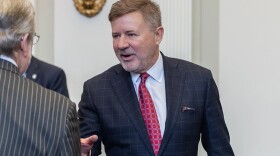About 30 demonstrators gathered outside the Oklahoma Corporation Commission on Tuesday.
Holding yellow umbrellas and chanting “Don’t Block The Sun,” the protesters spoke out against a proposal by Oklahoma Gas and Electric to include a demand charge on the bills of rooftop solar customers.
Mark Davies is the director of the World House Institute for Social and Ecological Responsibility at Oklahoma City University. He argues OG&E's plan discourages residents from installing solar energy panels by squashing demand for the equipment.
“The combine effect of these proposed charges would be to undermine any savings solar customers would have achieved,” Davies said. “And it could triple the payback time, which could really be the difference between people making the choice for solar power or not.”
State law allows utilities to impose such tariffs to recover the costs necessary to serve customers who use solar energy. Esther Houser is one of those solar panel users, and a volunteer with the Sierra Club. She says OG&E expects people who have invested personal money into solar equipment to pay the utility a fee when the privately funded system generates more than the dwelling needs.
“I call that absurd,” Houser said. “Perhaps instead OG&E should be paying the citizen who’s generating the excess solar power a fee for saving OG&E from having to build, supply, operate, and maintain new power generating systems.”
Steve Wilke, a business development analyst with the Norman-based wind and solar installer Delta Energy and Design, said his customers actually help utilities by generating power when the utility grid is most stressed.
“The fees are discriminatory. They discourage private investment,” Wilke said. “They are monopolistic, and they use the regulatory process to benefit their own investors rather than ratepayers."
About 25 residents offered public comments during yesterday afternoon's hearing. The demand charge would only apply to residential customers who installed solar panels or small wind turbines after November 2014, according to The Oklahoman’s Paul Monies:
During the hearing, a former Ohio regulator testifying on behalf of OG&E said the proposed tariff for new distributed generation customers was an attempt to make billing more transparent. He said it would ensure those customers pay the right amount of grid connection costs. Ashley Brown, who spent 10 years as public utility commissioner in Ohio, said Oklahoma's current policy for net metering was unfair because it made the utility take back excess power from customers at the retail rate rather than the wholesale rate. That didn't account for those customers' use of the grid.
OG&E wants to establish a demand charge for residential distributed generation customers who install solar panels or small wind turbines after November 2014.
State Sen. AJ Griffin also spoke during the hearing. She authored a bill last year that allows regulated utilities to apply for new tariffs if they can prove customers aren’t paying what they should in order to connect to the grid.
During the hearing the Guthrie Republican said she didn’t have a stance on OG&E’s plan, and criticized the characterization of her Senate bill as anti-solar, Monies reports:
Instead, Griffin said the Legislature wanted to act before the growth of rooftop solar became a problem in future utility ratemaking. “We have a rate structure that does not address the impending growth of renewable usage at the retail level,” Griffin said. “We know this will happen. Part of it has been spurred, quite frankly, by the redistribution of tax dollars to the individuals able to invest in these technologies. But those technologies are about to get to the place where they are out of their infancy stage. However, we do not have a utility rate structure that accommodates that growth.”
The hearing resumes at 10:30 Wednesday morning.
KGOU is a community-supported news organization and relies on contributions from readers and listeners to fulfill its mission of public service to Oklahoma and beyond. Donate online, or by contacting our Membership department.









